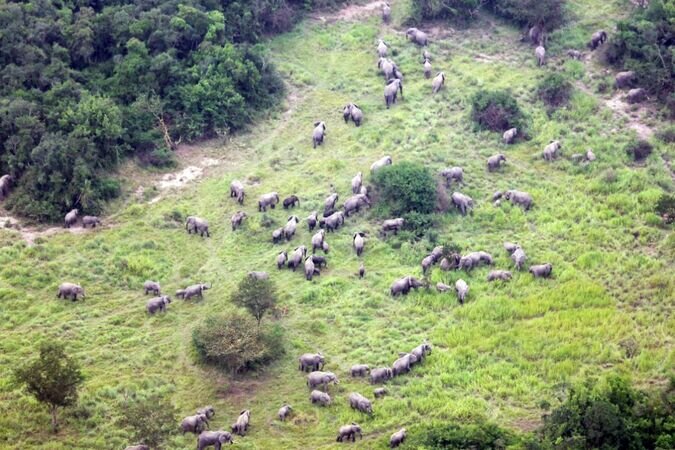Since mid-2020, Virunga National Park in the Democratic Republic of the Congo has seen some unexpected guests that have stuck around- a herd of about 580 African elephants that crossed into the park from bordering Uganda’s Queen Elizabeth National Park.
—
Together with the 120 or so elephants already in Virunga, this current group of elephants brings the total to at least 700 individuals. According to authorities at the park, groups of this size are increasingly rare due to poaching.
The move to Virunga is not only the result of the park’s recent and critical conservation efforts in its central savanna, but as the elephants tear through the trees and pummel invasive bushes, they are also transforming the landscape back to a true grassland savanna, allowing the return of grazers and other wildlife species that have been absent from the park for the last two decades: buffalo, Ugandan kob, warthogs, topi and even a pair of lions.
Anthony Caere, an anti-poaching pilot at Virunga National Park, says, “For years I haven’t seen any animals when I flew over this area- just rebels. Now not only are we seeing the elephants, which is an unbelievable sight from above, but we’re noticing the impact of such a big herd on the park. They’re restoring everything back to what it was 50 years ago and doing so much faster than we could have imagined. If the elephants continue to stay here in Congo in these numbers, this place will look totally different in just a few years.”
You might also like: Europe’s Most Invasive Species Identified- Study
In recent decades, smaller numbers of elephants would move naturally back and forth between Queen Elizabeth National Park and Virunga in Congo, which was the first national park to be established in Africa and is home to more species of birds, reptiles and mammals than any other protected area on the continent. In recent years, however, the presence of armed militia who hunt the animals and illegal agriculture in Virunga scared away most of the savanna elephants. To address these threats, Virunga rangers and staff have focused on securing the area from militia presence and working on development initiatives with the local community.
Wes Sechrest, Global Wildlife Conservation chief scientist and CEO, says, “This is a really incredible example of rewilding our planet by giving nature a bit of help and then letting the elephants, in this case, take care of the rest. Providing the conditions for nature to recover is critical to the future of our planet as we tackle climate change, wildlife extinction and pandemics. Virunga is demonstrating that it is possible for us to not only protect wildlife and wildlands, but to restore them in ways that will help ensure a healthier planet.”
This discovery is welcome news for the park, which in April experienced a brutally fatal attack from a militia group. This, in combination with the park being closed to tourism since March and battling both COVID-19 and Ebola, should raise spirits somewhat.
Emmanuel De Merode, director of Virunga National Park, says, “The return of large elephant herds to Virunga is the outcome of decades of extraordinary efforts on the part of Congo’s park rangers. Considerable work remains to ensure that the park makes a significant contribution to the wellbeing of the local community.”
The park, with support from Leonardo DiCaprio, Global Wildlife Conservation, Emerson Collective, and the European Commission, launched a Virunga Fund earlier this year to provide urgent support to the park to deliver critical disease prevention efforts, law enforcement, and the protection of its wildlife, in addition to supporting the families of rangers who have fallen in the line of duty. Donations can be made at https://www.globalwildlife.org/virunga-fund/.

















